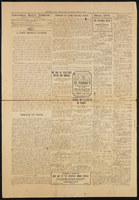Search the Special Collections and Archives Portal
Search Results
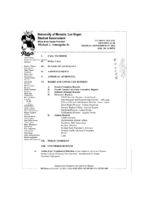
Meeting minutes for Consolidated Student Senate, University of Nevada, Las Vegas, September 15, 2003
Date
Archival Collection
Description
Text
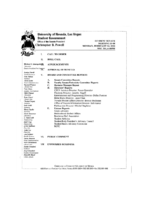
Meeting minutes for Consolidated Student Senate, University of Nevada, Las Vegas, February 24, 2003
Date
Archival Collection
Description
Text
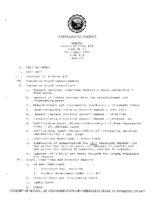
Meeting minutes for Consolidated Student Senate, University of Nevada, Las Vegas, August 09, 1983
Date
Archival Collection
Description
Text
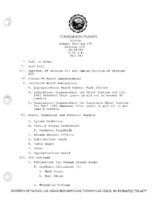
Meeting minutes for Consolidated Student Senate, University of Nevada, Las Vegas, June 28, 1983
Date
Archival Collection
Description
Text

Meeting minutes for Consolidated Student Senate University of Nevada, Las Vegas, January 31, 1985
Date
Archival Collection
Description
Text
Las Vegas African American Community Conversations round table interviews
Identifier
Abstract
The Las Vegas African American Community Conversations is a four-part conversation with local Las Vegans. The first part of the round table is moderated by Trisha Geran with a central theme of "Migration, Work and Community Emergence." The panelists discuss the early history of the African American community in Las Vegas, Nevada. They also discuss how and why their families moved to Las Vegas, most citing the economic opportunities as a major factor. The participants share their personal histories and family histories building up the African American community in downtown Las Vegas and the Westside. The second part of the round table is moderated by Sonya Horsford with a central theme of "Education, Economy, and Integration." The panelists discuss the Clark County School District pre- and post-integration. They discuss the hardships of the Sixth Grade Center Integration Plan on the African American community as well as discussing the differences in the school facilities. The round table participants also discuss the social services and social programs and the history of those programs from the African American perspective. They also discuss civic involvement and the various civic groups started by the panelists, and share discrimination they faced.
The third part of the round table is moderated by Claytee D. White with a central theme of "Civil Rights and Entertainment." The panelists discuss the racism and segregation present in Las Vegas and discuss how African American community leaders worked to integrate African Americans into the Las Vegas community. They discuss the 1969 riots in detail, and discuss African American entertainers and the entertainment industry. They share personal experiences working in the entertainment industry and discuss the importance of the local unions, such as the Culinary Workers Union Local 226, the International Alliance of Theatrical Stage Employees Local 720, and their contributions to the unions. The fourth and final part of the round table is moderated by Rachel Anderson with a central theme of the "Early African American Legal Community." The panelists discuss the foundations of the professional legal community in Las Vegas, noting the contributions of Charles Keller, Dr. William Bailey, and the Reverend Marion Bennett as driving forces for civil rights activism in Las Vegas. They share their experiences growing up in Las Vegas facing discrimination and segregation. Lastly, they share the changes they have seen and how both the legal and African African communities have grown.
Archival Collection
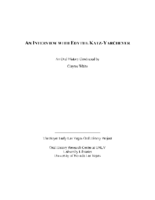
Transcript of interviews with Edythe Katz-Yarchever by Claytee White, 2000-2005
Date
Archival Collection
Description
Transcript of interviews with Edythe Katz-Yarchever by Claytee White over the course of several sessions in 2000, 2003 and 2005. In the interviews, Katz-Yarchever discusses her life in Las Vegas, owning theaters with her husband, Lloyd Katz, and the strides they made in civil rights. She talks about her service in Civil Defense and the National Guard, and moving to various places, then working in California and meeting her husband, Lloyd. The Katzes became involved in the community in various ways with Operation Independence and Holocaust education. About a decade after Lloyd's death, Edythe married Judge Gilbert Yarchever.
Edythe Katz-Yarvhever was born in Boston, a second generation American whose grandparents left Russia the century before. Edythe completed finishing school at the start of World War II and worked various jobs at home before joining the Civil Defense, and later, the National Guard. She moved to Maryland and got a job as a secretary at Edgewood Arsenal, then transferred to Cushing General Hospital to assist a Marine Corps neurologist, who was also a Jewish refugee. Towards the end of the war, she is transferred to an Army hospital in Hawaii, and thus began the rest of her life on the West Coast. When the war ended, Edythe sailed to California and worked various jobs in Los Angeles: in the secretarial pool at MGM Studios, for a casting agency and for a hotel magazine. Edythe met Lloyd Katz in San Francisco, and the two were married after a short courtship. The couple lived in San Francisco before moving to Las Vegas in 1951, where they took over the management of the Huntridge, Palace and Fremont theaters, then leased by Edythe's parents. The Katzes took a stand to desegregate their theaters, allowing black customers to sit with white patrons. Edythe and Lloyd became active in the city's Civil Rights Movement, including work with Operation Independence and the NAACP. Edythe started organizations like Volunteers for Education and Junior Art League, and directed an interfaith, interracial preschool. Lloyd would frequently open up their theaters to organizations to hold fundraisers, free-of-charge. Edythe was extremely active in the local Jewish community, including opening the city's first Jewish gift shop, serving as sisterhood president at her synagogue and starting the Jewish Reporter. She later founded a library for Holocaust education as well as assisted the school district's development of curriculum and teacher training relating to the Holocaust. Lloyd Katz passed away in 1986, and in 1995, Edythe married Gilbert Yarchever. Edythe and Lloyd's community service work was honored with the naming of their school, the Edythe and Lloyd Katz Elementary School, where Edythe still remains active.
Text
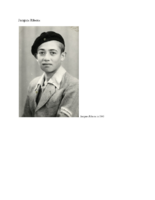
Biographical essay by Jacques Ribons, 2014
Date
Archival Collection
Description
Jacques Ribons describes his life during the Nazi occupation of Poland. During the liquidation of the Jewish ghetto, his family decided to turn themselves in to the Germans. They were sent to a prison and separated. He and his brother survived and went to France with the OSE, and came to the United States in 1947.
Text
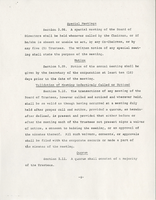
By-laws of the Nathan Adelson Hospice, November 30, 1978
Date
Archival Collection
Description
The by-laws of the Nathan Adelson Hospice establish the purpose and organization of the program, founded in 1978 in Las Vegas.
Text

